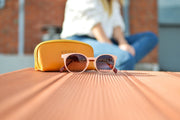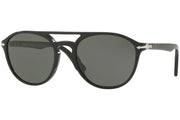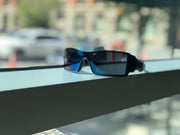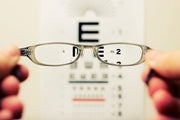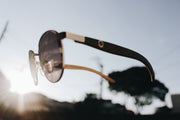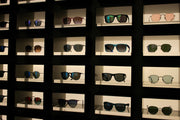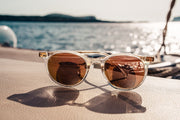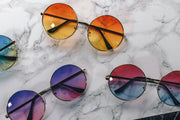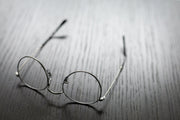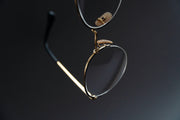It can be asserted that anti-glare coatings can bring dozens of advantages to their owners. In addition to resisting UV rays harmful to the eyes, it can improve visibility, reduce glare from traffic lights, and reduce scratches.
Thanks to the above benefits, owning a glass with anti-glare coating is gradually becoming a trend. However, the price of this coating is quite high. Therefore, the question "can I make my glasses anti-glare" is increasingly popular. So the answer is yes or no? Scroll down to find out!
Can I Add Anti Reflective Coating to My Glasses?
During The Purchase
The response to this matter is an obvious yes. Choosing a no-glare coating during purchasing is a good financial idea. This decision can be integrated into the manufacturing process, making it more cost-effective for you and the AR glasses manufacturer. As you may not know, a pair of previous AR-coated glasses are $20 - $30 cheaper than latter-coated ones!
Usually, you have to specify that you want the AR feature during the payment process. If you shop online, you can even opt for AR coating on all lenses and frames with a single click in most online eyeglasses stores these days. You may have to pay a small additional fee for this convenience.
However, it is quite worth the money because you do not need to go far, nor do you need to meet many people during the epidemic, and still have a good anti-glare coating.
After The Purchase
After purchasing the glasses, you can still add an anti-reflective coating. You can even add this coating to your old glasses, but of course, only if they are in good enough condition. Even a very small error in the glass can cause failure.
Therefore, when assessing the condition of your glasses, there are many aspects to consider. Here are a few things you definitely have to check before applying an AR cover:
- Firstly, for best results, make sure your glasses don't have any oils on them. Leaving oils, especially skin-derived ones, on the glass before the AR coating process may lead to oil sticking, thereby reducing the visibility and aesthetic of glasses users!
- Second, your eyeglasses must be free from scratches and other defects. This is because no-glare covers can only be applied on a flat surface. If the lenses are not smooth enough, they will not be as effective at reducing glare for your eyes.
Many inexperienced or authorized retailers will not agree to add coatings for you even if your lenses meet the above requirements. However, if you go to the right place, your glasses will be treated in the most professional way by opticians. Rest assured when handing your glasses over; they will help you clean and apply an anti-glare coating according to the correct procedure.
Don't worry, even if your glasses have some faults. Your optical specialists will help you spot the problem and find a way to fix it for you. If there are some scratches on the lenses that cannot be repaired, they will advise you on what to do next.
It can be buying new lenses that include anti-glare coating and fit into your existing frames, choosing another type of coating, etc. Yet in any way, all you have to do is to trust them, and you will be good.
How Can I Add Anti Reflective Coating to My Glasses?
Often people will bring their glasses to the professionals to have the no-glare coating added. However, if you are a handy person, adding it yourself at home is not impossible.
Step 1: Prepare the oven
The first step is not too difficult but very important. There's usually a section of instructions on the back of the AR spray bottle. Rotate and find it. The temperature for heating your glasses will be clearly stated above. Then, according to that, preheat your oven. This will help you get the right heat as soon as you put the glasses in and get the best result.
Step 2: Prepare the eyeglass
Next is the cleaning step. You have to remove your lenses and start cleaning them with a cloth and suitable cleaner. Carefully remove all dirt, oil, debris and even dirty water from the glass. As noted above, all of these can cause coating failures.
Step 3: Spray the anti-reflective coating on your eyeglass
Grab a tong and use it to hold your lenses up. This will make it easier to spray the anti-reflective coating on both sides of the glass.
Also, don't forget to wear gloves while spraying. It is best to use rubber gloves because it is very difficult to remove if the glass-spray solution gets on your skin or clothes.
The distance from the bottle to the glass is best between 12 and 18 inches. Please keep the spray coating thin and even. Do not spray too much on the lens, this may interfere with subsequent steps.
Step 4: "Bake" the eyeglass
Here is the most important step, put the lenses that have just sprayed the coating on the baking pan. Then place the pan in the preheated oven. Different coating brands need different heating times, you can refer to this time in the instructions as step 1. However, in general, brands need a minimum of about 1 hour to bake perfectly.
Step 5: Finish
Prepare a "safe" area. This place must be free of dust, dirty water, oil, debris or even wind.
Remove the baked lenses from the iron and let them cool in the prepared location. After they have completely cooled down, clean them thoroughly with glass cleaner and soft fabric. Put them in the frames immediately after that to limit the possibility of scratching the lenses.
Conclusion
Because of the benefits brought, anti-glare coatings are quite expensive. However, creating an anti-glare coating yourself is not impossible. You can add it during the purchase or after purchase. You can also choose between having an expert cover it or doing it yourself. Everything is possible!
Above is all information about the process of making a no-glare cover. After reading this article, we hope you have answered the question, "can I make my glasses anti-glare.” Have a nice day and good luck with your AR coating work!



